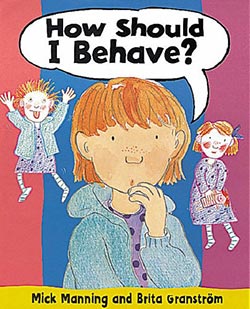This book is set out in question and answer format and deals with behaviour: helpfulness, co-operation, and being polite. The book explains how it’s not good to interrupt when others are talking and how swear words are not acceptable. There is a section on table manners and burping, and another on how to behave when using the toilet. It explains that children should help in the home, be patient in queues and help with the shopping. It also tackles bullying, telling tales, getting lost and ‘stranger danger’. The book acknowledges that no-one can be good all the time, but we should try to help each other, and being polite is more fun and fairer than being rude.
Categories: Bullying, Violence & Abuse, Friendship & Getting Along, Listening & Co-operating, Manners & Politeness, Safety and Protection, Tidiness & Helping Out
How Should I Behave?
 A good way to start a discussion with young children on what constitutes acceptable behaviour. Promotes good manners, co-operation, helping and politeness.
A good way to start a discussion with young children on what constitutes acceptable behaviour. Promotes good manners, co-operation, helping and politeness.
Author: Mick Manning
Illustrator: Brita Granstrom
Publisher: Franklin Watts
Worth noting:
Despite the fact that this is essentially a book of 'do's and don'ts', it should hold young children's attention and entertain them if tackled in bite-size chunks.
Review by: Rosemary Griffith

